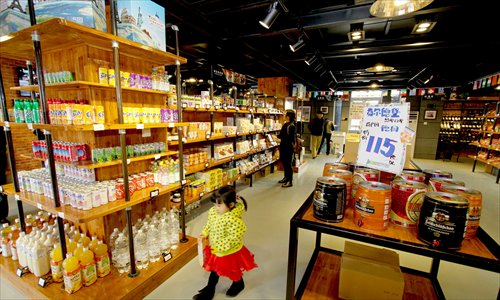FTAs with S.Korea, Australia come into effect
Over 4,000 imported items now tariff-free

Imported goods in a store in the Tianjin Free Trade Zone. Photo: CFP
The free trade agreements (FTAs) China has signed with South Korea and Australia officially came into effect on Sunday, with tariffs on numerous products being cut for the first time.
Under the agreements, tariffs on 2,402 items imported from Australia were reduced to zero on Sunday, while 1,649 items from South Korea are now also tariff free, the Xinhua News Agency reported on Sunday.
China and South Korea signed an FTA in Seoul on June 1, with the agreement covering 17 fields such as trade in goods and services, and rules for investment and trade, according to a statement released by the Ministry of Commerce (MOFCOM) on June 2. Under the agreement, China will remove tariffs on 91 percent of products imported from South Korea and South Korea will eliminate tariffs on 92 percent of products from China within 20 years of implementation of the FTA.
China spent more than 10 years on talks over its FTA with Australia, and finally signed the agreement on June 17. The deal covers more than 10 areas, including goods, services and investment, according to a statement from MOFCOM on June 23.
The deal is one of the most extensive among all the FTAs that China has signed in terms of trade and investment liberalization, the statement said. For trade in goods, 85.4 percent of products from both sides are now exempt from tariffs, according to MOFCOM.
In 2014, bilateral trade between China and Australia increased 23 percent year-on-year to A$152.9 billion ($109.72 billion), while the trade volume between China and South Korea rose 5.95 percent to $290.6 billion, according to data from MOFCOM.
"The FTAs will help to spur bilateral trade between China and South Korea, and China and Australia," Chen Fengying, a research fellow with the China Institutes of Contemporary International Relations, told the Global Times on Sunday, adding that it will also have a "significant impact in boosting regional economic cooperation."
For instance, signing the FTA with South Korea is expected to ease cooperation between China, South Korea and Japan, Chen noted.
So far, China has signed 14 FTAs, 12 of which have gone into effect, covering 22 countries and regions, MOFCOM said on Thursday.
Also, the State Council, China's Cabinet, released guidelines on Thursday to accelerate the speed of signing new FTAs with neighboring countries and regions, in order to build a global FTA network and better serve the country's economic development, according to a statement posted on the central government's website.
It's important for China to enhance the quality of its cooperation with other countries and regions, Chen said, noting that FTAs can also boost Chinese investment overseas.
For example, under the FTA between China and Australia, Australia will lower the approval threshold, making it easier for Chinese firms to invest in Australia.
Meanwhile, consumers from the two countries will also benefit. For instance, Chinese consumers will be able to buy electronics and skin-care products from South Korea and wine from Australia at lower prices.
The FTA will help in cutting costs, but it "will take time for the FTA to show its effect for wine importers," Chen Yimin, vice general manager of Shanghai Longmeng International Trading Co, a wine trading company based in Shanghai, told the Global Times on Sunday.
He also warned that there are still other factors affecting costs for importers such as exchange rate fluctuations.
Chen, the research fellow, noted that the FTAs would reduce Chinese consumers' interest in using the illegal services provided by daigou, agents who buy products overseas at cheaper prices and send them back to individual buyers in the mainland.